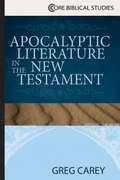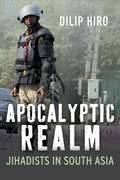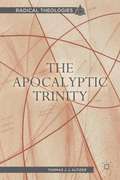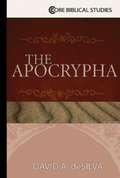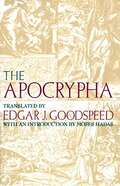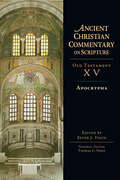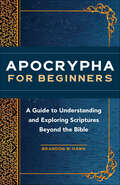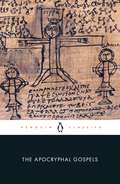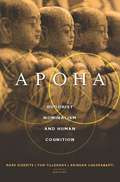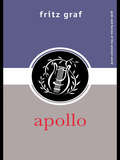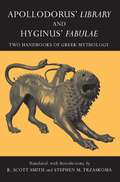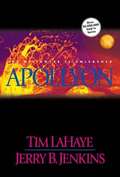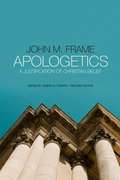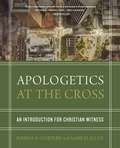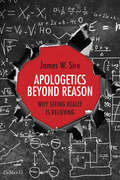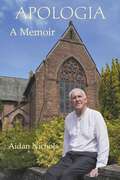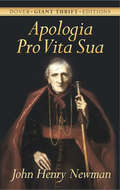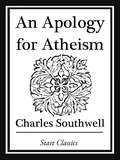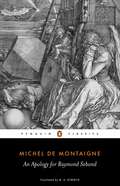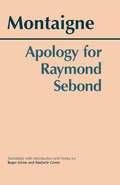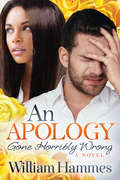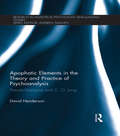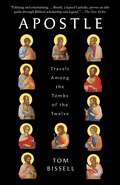- Table View
- List View
Apocalyptic Literature in the New Testament (Core Biblical Studies)
by Greg CareyEvery significant layer of the New Testament features the distinctive concerns of apocalyptic literature, including the expectation of a messiah, hope for a resurrection, expectation of a final judgment, and a spiritual world that includes angels and demons. Yet many contemporary readers shy away from things apocalyptic, especially the book of Revelation. This introduction considers the influence of apocalyptic literature throughout the Gospels and Acts, Paul's letters, and Revelation. It argues that early Christian authors drew upon apocalyptic topics to address an impressive array of situations and concerns, and it demonstrates--example after example--how apocalyptic discourse contributed to their ongoing work of contextual theology.
Apocalyptic Realm
by Dilip HiroThis hard-hitting and timely book explores the roots of militant Islam in South Asia and how it has grown to become a source of profound global alarm. By meticulously tracking the rise of the jihadist movement from its initial violence in Afghanistan in 1980 to the present day, Dilip Hiro challenges conventional narratives of the roles of Afghanistan, Pakistan, the Soviet Union, the United States, and India. He warns that the Line of Control in Kashmir, where jihadists seek to incite war between nuclear-armed Pakistan and India, is today the most dangerous border in the world. Drawing on evidence from a wide variety of sources including newly released Kremlin archives and classified U. S. Embassy documents published by WikiLeaks, the author compiles the first complete and accurate history of Islamist terrorism in South Asia. He chronicles historic links between Pakistan, Afghanistan, and India and their varying degrees of destabilization at the hands of the jihadists. He also sheds unprecedented light on the close military and intelligence links that have developed between India and Israel. Finally, he outlines the ambitions of Pakistani, Afghan, and Al Qaeda jihadists to establish an "apocalyptic realm" covering South, Central, and Western Asia. Compact, comprehensive, and fast paced, this book lays bare the causes of today's escalating terrorist threat, sets the historical record straight, and offers fresh strategies for defeating jihadist extremism.
The Apocalyptic Trinity
by Thomas J. J. AltizerThis book is a major step forward in radical theology via a sustained and creative challenge to conventional and orthodox thinking on the Trinity. Altizer presents a radical rethinking of the apocalyptic trinity and recovers the apocalyptic Jesus of Hegel, Blake, and Nietzsche.
The Apocrypha: Message, Context, And Significance
by David DesilvaFor many across the world, the books of the Apocrypha are Christian Scripture. Learn more about them as you learn more about how Jesus thought and lived. Using a thematic approach, Dr. David deSilva gives a brief introduction and summary of these largely unknown and unappreciated books. In addition the book gives an overview to the social and cultural context of the world of the Apocrypha and early Christianity. After surveying the Apocrypha's relevance and impact on Christian practices and spiritual formation, the book highlights the Apocrypha's impact on Jesus, the New Testament, and the formation of the Early Church's doctrines and theology. Core Biblical Studies fulfill the need for brief, substantive, yet highly accessible introductions to key subjects and themes in biblical studies. In the shifting tides of biblical interpretation, these books are designed to help students locate relevant meanings in conversation with the text. As a first step toward substantive and subsequent learning, the series draws on the best scholarship in order to provide foundational concepts and contextualized information on a broad scope of issues, methods, perspectives, and trends.
The Apocrypha
by Edgar J. GoodspeedThe powerful collection of books from the Greek version of the Jewish Bible—the earliest complete version of the Bible we possess—but that were not included in the final, canonical version of the Hebrew Bible. <p><p> They were called “Apocrypha,” the hidden or secret books, and while they formed part of the original King James version of 1611, they are no longer included in modern Bibles. Yet they include such important works as The First Book of Maccabees, the Wisdom of Solomon, Ecclesiasticus, and the stories of Susanna, Tobit, and Judith, and other works of great importance for the history of the Jews in the period between the rebuilding of the Temple and the time of Jesus, and thus for the background of the New Testament. These works have also had a remarkable impact on writers and artists. Beyond this, they are often as powerful as anything in the canonical Bible. <p><p> The translation into contemporary English is by Edgar J. Goodspeed.
Apocrypha (Ancient Christian Commentary on Scripture #15)
by Sever J. VoicuThis last volume of the Ancient Christian Commentary on Scripture offers commentary from the early church fathers on the deuterocanonical books of the Bible, with insights that will be of great benefit to preachers and teachers alike. Readers will find some ancient authors translated into English here for the first time. Throughout they will gain insight and encouragement in the life of faith as seen through ancient pastoral eyes.
Apocrypha for Beginners: A Guide to Understanding and Exploring Scriptures Beyond the Bible
by Brandon W. HawkGo beyond the Bible with this simple introduction to apocryphaWhether they were lost, cut, or censored, the various apocryphal stories offer unique opportunities to learn about the histories of Judaism and Christianity while broadening spiritual understanding. But exploring this vast canon of texts alone can be daunting. Apocrypha for Beginners makes it simple by offering a guided experience, helping explain each piece's importance and contextualize its place in history.This standout among religious books includes:More than 50 apocrypha—Delve into a variety of apocrypha from different eras and cultures, like the Book of Enoch, the Gospel of Judas, and more.In-depth commentary—Better understand each text with a brief summary of its origin, meaning, and cultural significance.Easy-to-follow info—Explore the history of Judaism and Christianity with the help of a detailed timeline, canon comparison chart, and index of important individuals.Take your Bible study to the next level with Apocrypha for Beginners.
The Apocryphal Gospels
by Simon GathercoleA new translation of the oldest non-canonical Christian gospels In the early years of Christianity, several groups produced 'hidden' or 'apocryphal' gospels, alternative versions of the story of Christ. Sometimes these texts complemented the four canonical gospels of the New Testament, sometimes they subverted them and often they were completely different. Here, in the widest selection of non-canonical gospels gathered in one volume - which also includes two modern forgeries - we see the young Jesus making live birds from clay, hear his secret words of wisdom, discover gnostic cosmologies and witness the Harrowing of Hell. Preserved by their readers and attacked by their detractors, these gospels shine a fascinating light on the early Christian Church.Translated with an Introduction by Simon Gathercole
Apoha: Buddhist Nominalism and Human Cognition
by Siderits Mark Tom Tillemans Arindam Chakrabarti Eds.When we understand that something is a pot, is it because of one property that all pots share? This seems unlikely, but without this common essence, it is difficult to see how we could teach someone to use the word "pot" or to see something as a pot. The Buddhist apoha theory tries to resolve this dilemma, first, by rejecting properties such as "potness" and, then, by claiming that the element uniting all pots is their very difference from all non-pots. In other words, when we seek out a pot, we select an object that is not a non-pot, and we repeat this practice with all other items and expressions.Writing from the vantage points of history, philosophy, and cognitive science, the contributors to this volume clarify the nominalist apoha theory and explore the relationship between apoha and the scientific study of human cognition. <P><P>They engage throughout in a lively debate over the theory's legitimacy. Classical Indian philosophers challenged the apoha theory's legitimacy, believing instead in the existence of enduring essences. Seeking to settle this controversy, essays explore whether apoha offers new and workable solutions to problems in the scientific study of human cognition. They show that the work of generations of Indian philosophers can add much toward the resolution of persistent conundrums in analytic philosophy and cognitive science.
Apollo (Gods and Heroes of the Ancient World)
by Fritz GrafFritz Graf here presents a survey of a god once thought of as the most powerful of gods, and capable of great wrath should he be crossed: Apollo the sun god. From his first attestations in Homer, through the complex question of pre-Homeric Apollo, to the opposition between Apollo and Dionysos in nineteenth and twentieth-century thinking, Graf examines Greek religion and myth to provide a full account of Apollo in the ancient world. For students of Greek religion and culture, of myth and legend, and in the fields of art and literature, Apollo will provide an informative and enlightening introduction to this powerful figure from the past.
Apollodorus' Library and Hyginus' Fabulae: Two Handbooks of Greek Mythology
by R. Scott Smith Stephen M. TrzaskomaBy offering, for the first time in a single edition, complete English translations of Apollodorus' Library and Hyginus' Fabulae--the two most important surviving "handbooks" of classical mythography--this volume enables readers to compare the two's versions of the most important Greek and Roman myths. A General Introduction sets the Library and Fabulae into the wider context of ancient mythography; introductions to each text discuss in greater detail issues of authorship, aim, and influence. A general index, an index of people and geographic locations, and an index of authors and works cited by the mythographers are also included.
Apollyon: The Destroyer Is Unleashed (Left Behind, # #5)
by Jerry B. Jenkins Tim LahayeThe world holds its breath as the Tribulation Force ventures to Jerusalem for the great Meeting of the Witnesses, where tens of thousands defy the Antichrist to sit under the ministry of their pastor-teacher, Tsion Ben-Judah. Meanwhile, Rayford Steele finally discovers the shocking truth about his wife, Amanda, but becomes an international fugitive. The fifth Trumpet Judgment-a plague of scorpion-like locusts led by Apollyon, chief demon of the abyss -is so horrifying that men try to kill themselves but are not allowed to die. This book has reached the New York Times best-seller list and is the most shocking and explicit portrayal yet in the continuing drama of those left behind.
Apollyon: The Destroyer Is Unleashed (Left Behind Series #Book 5)
by Tim Lahaye Jerry B. JenkinsThe #1 best-selling hardcover novel of 1999 is now available in softcover! The Tribulation Force travels to Israel for the Meeting of Witnesses as further judgments are released upon the world. Satan falls from heaven and opens the bottomless pit, releasing Apollyon and his plague of locusts that torture the unsaved. Now available in trade softcover, Apollyonis a thriller that will be tough to put down.
Apologetics: A Justification Of Christian Belief
by John M. Frame Joseph E. TorresRenowned theologian John Frame sheds much-needed light on the message and method of genuinely Christian apologetics in this landmark title. He insightfully examines apologetics in terms of proof, defense, and offense and clarifies the relationships of reason, proofs, and evidences to faith, biblical authority, and the lordship of Christ. <p><p> Two subjects of particular note are Frame's fresh look at probability arguments and a stimulating investigation into the problem of evil. <p> Some of the most valuable elements of this book are Frame's extensive use of Scripture and his presentation of specific lines of argument. There is also a model dialogue in the concluding chapter that shows how these lines of argument work in conversation.
Apologetics at the Cross: An Introduction for Christian Witness
by Joshua D. Chatraw Mark D. AllenAmid the pluralism and secularism of Western culture, Christian apologetics has experienced a renewal of interest. In Apologetics at the Cross, Joshua D. Chatraw and Mark D. Allen provide an introduction to the field, acquainting students and lay learners with the rich history, biblical foundation, and ongoing relevance of apologetics.Unique in its approach, Apologetics at the Cross presents the biblical and historical foundations for apologetics, explores various contemporary methods for approaching apologetics, and gives practical guidance in "how to" chapters that feature many real-life illustrations. With their respectful approach, which pays special attention to the attitude and posture of the apologist, Chatraw and Allen equip Christians to engage skeptics with the heart as well as the mind.Conversational in tone and balanced in approach, Apologetics at the Cross provides a readable introduction to the field of apologetics. Readers will be informed and equipped for engaging a wide range of contemporary challenges with the best in Christian thought.
Apologetics Beyond Reason: Why Seeing Really Is Believing
by James W. Sire"Look carefully. Listen closely. Do you see? Do you hear? There are a million signposts pointing toward the specific truth of God in Christ. I've seen many of them. But God is speaking to you too. Look and see. Listen and hear." In this accessible and engaging work, veteran apologist Jim Sire gives us eyes to see the myriad "signals of transcendence" all around us that point to the specific truth of God in Christ. Focusing on the power of good literature—even from those who deny the existence of God—enables us to perceive and testify to God's reality in ways that rational argument alone cannot. "While reason can be very helpful in pointing us to God and helping us in our apologetics, what compels and convinces people is more multidimensional," says Sire. "What is needed is a more holistic apologetic that not only includes truth but also goodness and beauty." All inspiration is rooted in God the Creator, and some of God's truth lies buried until an artist exposes it. Good literature, written from a Christian standpoint or not, displays multiple examples of our human understandings of God, the universe and ourselves. It testifies to the existence of a transcendent realm and often, in fact, to the truth of the Christian faith.
Apologia: A Memoir
by Aidan NicholsAidan Nichols has been contributing to theological literature since the beginning of the 1980s. Now in his seventy-fifth year, he looks back not only at his writings but at the three-quarters of a century of life from which they came. He explains how, despite a nominally Anglican background, his early sense of the transcendent was really of God in nature. Only through an experience in the Russian church in Geneva did he become a confessing Christian. Back home, where he was left a teenage orphan, he moved from Anglo-Catholicism into the Roman Catholic Church. After reading Modern History at Oxford, that led by a natural progression to becoming a Religious and a priest. In this book Nichols describes the wide variety of situations in which he has lived in Scotland, Norway, Rome, France, Ethiopia, and Jamaica, as well as England and the United States. Over the years, drawing on not only Catholic but also Orthodox and Anglican sources, he has produced a small library of books, touching on many areas of theology and culture while also seeking, at different times, to bind them together into a coherent unity, inspired by, principally, two great giants: Thomas Aquinas, and Hans Urs von Balthasar.
Apologia Pro Vita Sua
by John Henry NewmanA highly influential figure in the Church of England, John Henry Newman stunned the Anglican community in 1843, when he left his position as vicar of St. Mary's, Oxford, to join the Roman Catholic church. Perhaps no one took greater offense than Protestant clergyman Charles Kingsley, whose scathing attacks against Newman's faith and honor inspired this brilliant response. Apologia Pro Vita Sua, Newman's spiritual autobiography, explores the depths and nature of Christianity with flowing prose and a conversational style that has ensured its status as a classic."False ideas may be refuted by argument, but by true ideas alone are they expelled. I will vanquish," Newman promised, "not my accuser, but my judges." His honest and passionate defense consists of a personal history of his religious convictions, from earliest memory through the Oxford movement and his ultimate conversion. His concluding point-by-point refutation of Kingsley's charges features thought-provoking contentions that strike at the very roots of the principles underlying Protestantism. Newman won respect and admiration with his Apologia, a work that has helped clarify perceptions of Roman Catholicism among readers of every faith.
An Apology for Atheism
by Charles SouthwellIt would be absurd to doubt that religion has an important bearing on all the relations and conditions of life. The connexion between religions faith and political practice is, in truth, far closer than is generally thought. Public opinion has not ripened into a knowledge that religious error is the intangible but real substratum of all political injustice. Though the 'schoolmaster' has done much, there still remain and hold some away among us, many honest and energetic assertors of 'the rights of man,' who have to learn that a people in the fetters of superstition, can never achieve political freedom. Many of these reformers admit the vast, the incalculable influence of Mahommedanism on the politics of Constantinople, and yet persist in acting as if Christianity had little or nothing to do with the politics of England.
An Apology for Raymond Sebond
by Michel MontaigneAn Apology for Raymond Sebond is widely regarded as the greatest of Montaigne's essays: a supremely eloquent expression of Christian scepticism. An empassioned defence of Sebond's fifteenth-century treatise on natural theology, it was inspired by the deep crisis of personal melancholy that followed the death of Montaigne's own father in 1568, and explores contemporary Christianity in prose that is witty and frequently damning. As he searches for the true meaning of faith, Montaigne is heavily critical of the arrogant tendency of mankind to create God in its own image, and offers his personal reflections on the true role of man, the need to eschew personal arrogance, and the vital importance of faith if we are to understand our place in the universe. Wise, perceptive and remarkably informed, this is one of the true masterpieces of the essay form.
An Apology for Raymond Sebond
by Michel De Montaigne M. A. ScreechIn his introduction, Screech writes: "Montaigne gives his readers the fruits of his own wide reading and of his own reflections upon it, all measured against his personal experience during a period of intellectual ferment and of religious and political disarray. Montaigne never let himself be limited by his office or station. As husband, father, counsellor, mayor, he kept a critical corner of himself to himself, from which he could judge in freedom and seek to be at peace with himself. He does not crush his reader under the authority of the great philosophers: he tries out their opinions and sees whether they work for him or for others. Traces of Plato, Aristotle, Plutarch, Cicero, St Augustine or of his own contemporaries can be found in every page he wrote, but they are skilfully interwoven into his own discourse, being renewed and humanized in the process. And he hardly ever names them. An Apology For Raymond Sebond has all these qualities, despite its being the longest piece Montaigne ever wrote. In it, Montaigne remains triumphantly himself."
An Apology Gone Horribly Wrong: A Novel
by William HammesAn Apology Gone Horribly Wrong is a romantic comedy set in the mid-1980s that explores deep wounds and the role trust plays in everyday life.When Sam Milton tries to apologize to the beautiful Chantell León, a top recording artist, for a minor traffic accident, the apology goes horribly wrong. Having already fumbled the apology once in the moment, Sam makes it worse by chasing Chantell down at Universal Studios, sending Chantell into a tirade on national TV, and pleading with her fans for protection. The situation continues to spin out of control as a vigilante mob goes looking for Sam. Within hours, Sam loses everything, including his house, finances and reputation.Fortunately, a friend of Sam&’s is able to get the two together in hopes of resolving the situation. To avoid a huge multimillion dollar lawsuit, Sam comes up with a plan to let Chantell reimburse everything she has taken from him by completing six simple tasks. Although each is simple in nature and starts out easy, each sequential task becomes more difficult and requires her to have more and more trust in someone she doesn&’t trust at all. As the pair moves through their journey, feelings develop, and they realize God is using them to vet out deep wounds. However, things don&’t go as planned and, soon, massive amounts of trust will be required of each. Can they learn to trust each other and heal their emotional wounds despite all they&’ve been through?
Apophatic Elements in the Theory and Practice of Psychoanalysis: Pseudo-Dionysius and C.G. Jung (Research In Analytical Psychology And Jungian Studies)
by David HendersonHow can the psychotherapist think about not knowing? Is psychoanalysis a contemplative practice? This book explores the possibility that there are resources in philosophy and theology which can help psychoanalysts and psychotherapists think more clearly about the unknown and the unknowable. The book applies the lens of apophasis to psychoanalysis,
Apostle
by Tom BissellA profound and moving journey into the heart of Christianity that explores the mysterious and often paradoxical lives and legacies of the Twelve Apostles--a book both for those of the faith and for others who seek to understand Christianity from the outside in. Peter, Matthew, Thomas, John: Who were these men? What was their relationship to Jesus? Tom Bissell provides rich and surprising answers to these ancient, elusive questions. He examines not just who these men were (and weren't), but also how their identities have taken shape over the course of two millennia. Ultimately, Bissell finds that the story of the apostles is the story of early Christianity: its competing versions of Jesus's ministry, its countless schisms, and its ultimate evolution from an obscure Jewish sect to the global faith we know today in all its forms and permutations. In his quest to understand the underpinnings of the world's largest religion, Bissell embarks on a years-long pilgrimage to the supposed tombs of the Twelve Apostles. He travels from Jerusalem and Rome to Turkey, Greece, Spain, France, India, and Kyrgyzstan, vividly capturing the rich diversity of Christianity's worldwide reach. Along the way, he engages with a host of characters--priests, paupers, a Vatican archaeologist, a Palestinian taxi driver, a Russian monk--posing sharp questions that range from the religious to the philosophical to the political. Written with warmth, empathy, and rare acumen, Apostle is a brilliant synthesis of travel writing, biblical history, and a deep, lifelong relationship with Christianity. The result is an unusual, erudite, and at times hilarious book--a religious, intellectual, and personal adventure fit for believers, scholars, and wanderers alike.From the Hardcover edition.
Apostle: Travels Among the Tombs of the Twelve
by Tom BissellA profound and moving journey into the heart of Christianity that explores the mysterious and often paradoxical lives and legacies of the Twelve Apostles—a book both for those of the faith and for others who seek to understand Christianity from the outside in.“Expertly researched and fascinating… Bissell is a wonderfully sure guide to these mysterious men.… This is a serious book about the origins of Christianity that is also very funny. How often can you say that?” —The Independent Peter, Matthew, Thomas, John: Who were these men? What was their relationship to Jesus? Tom Bissell provides rich and surprising answers to these ancient, elusive questions. He examines not just who these men were (and weren’t), but also how their identities have taken shape over the course of two millennia. Ultimately, Bissell finds that the story of the apostles is the story of early Christianity: its competing versions of Jesus’s ministry, its countless schisms, and its ultimate evolution from an obscure Jewish sect to the global faith we know today in all its forms and permutations. In his quest to understand the underpinnings of the world’s largest religion, Bissell embarks on a years-long pilgrimage to the supposed tombs of the Twelve Apostles. He travels from Jerusalem and Rome to Turkey, Greece, Spain, France, India, and Kyrgyzstan, vividly capturing the rich diversity of Christianity’s worldwide reach. Along the way, he engages with a host of characters—priests, paupers, a Vatican archaeologist, a Palestinian taxi driver, a Russian monk—posing sharp questions that range from the religious to the philosophical to the political. Written with warmth, empathy, and rare acumen, Apostle is a brilliant synthesis of travel writing, biblical history, and a deep, lifelong relationship with Christianity. The result is an unusual, erudite, and at times hilarious book—a religious, intellectual, and personal adventure fit for believers, scholars, and wanderers alike.From the Hardcover edition.
